Key takeaways:
- Identified key learning challenges: procrastination, time management, and difficulty retaining information.
- Set specific and measurable learning goals, leading to improved focus and motivation.
- Established a consistent study routine and explored effective learning techniques like active engagement and spaced repetition.
- Emphasized the importance of peer support and celebrating milestones to maintain motivation and a sense of community.
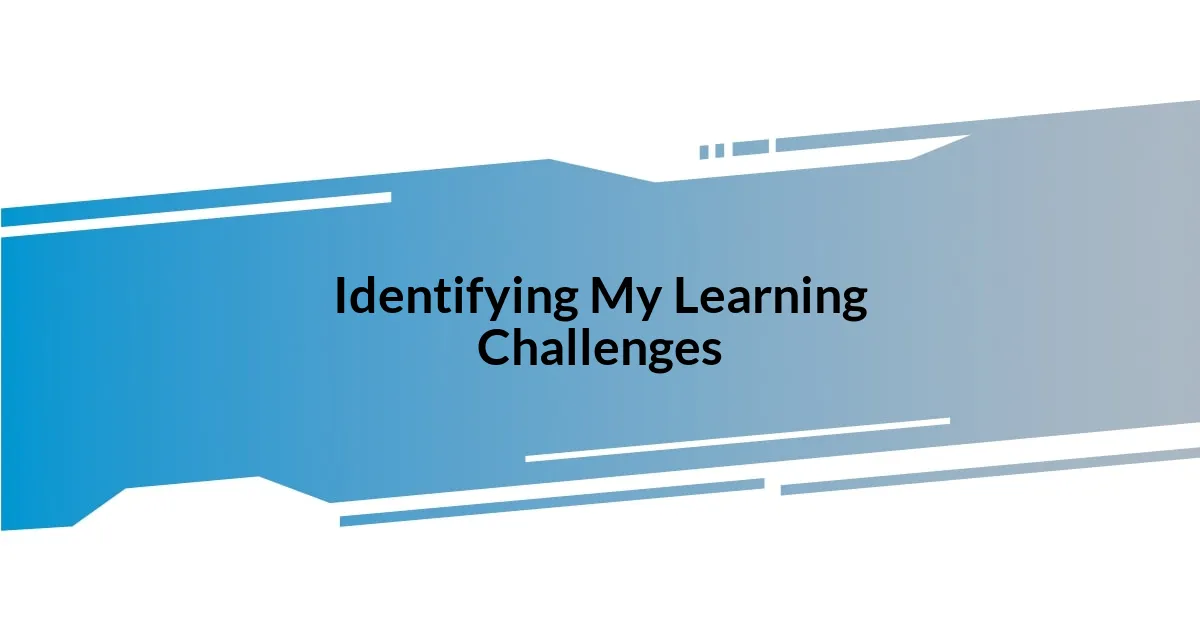
Identifying My Learning Challenges
When I first reflected on my learning challenges, I realized that procrastination was a significant hurdle for me. There were times when I could spend hours staring at my books, feeling overwhelmed by the sheer volume of material. Why did it take me so long to get started? I often felt trapped in a cycle of anxiety and avoidance that made everything feel impossible.
As I dug deeper into my experiences, I found that I also struggled with time management. Balancing various tasks often felt like juggling flaming torches; one misstep, and everything could come crashing down. I remember vividly the stress of cramming for an exam the night before, desperately wishing I had approached my studies differently.
Additionally, I noticed that I had difficulty retaining information, especially in subjects I found less engaging. I would read a passage only to forget it moments later, leaving me frustrated and disheartened. Has this ever happened to you? It made me question whether the methods I was using to learn were truly effective for my individual style and needs.
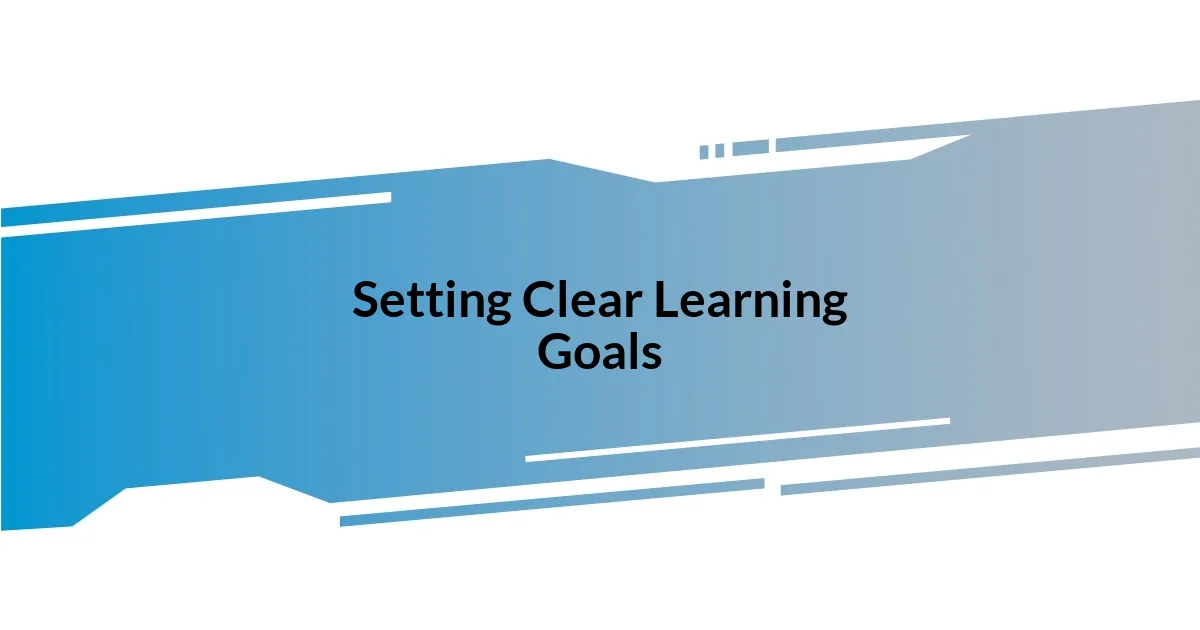
Setting Clear Learning Goals
Setting clear learning goals made all the difference in my journey. Initially, I used to dive into studying without a roadmap, which often left me feeling lost. Once I started defining specific, measurable goals, I found that each small victory along the way boosted my confidence and pushed me forward. For instance, rather than saying, “I want to study math,” I set a goal to “understand the quadratic formula by the end of the week.” This clarity provided focus, making my study sessions more productive.
Over time, I learned that breaking larger goals into manageable chunks was essential. Instead of trying to tackle an entire book, I aimed to read a chapter each day. This approach not only helped me avoid feeling overwhelmed but also created a sense of accomplishment as I ticked off each completed chapter. It’s like building a puzzle: focusing on one piece at a time made the bigger picture clearer and more attainable.
I encourage you to reflect on your learning priorities and how they align with your goals. Are they specific enough to guide you? When I personalized my goals, I discovered a profound connection between motivation and achieving them. It was no longer just about studying; it became about passion and purpose. By establishing clear learning goals, I transformed my education from a chore into an empowering journey.
| Old Goal Setting | New Goal Setting |
|---|---|
| Vague direction | Specific and measurable targets |
| Feeling overwhelmed | Step-by-step progress |
| Low motivation | Increased engagement and connection |
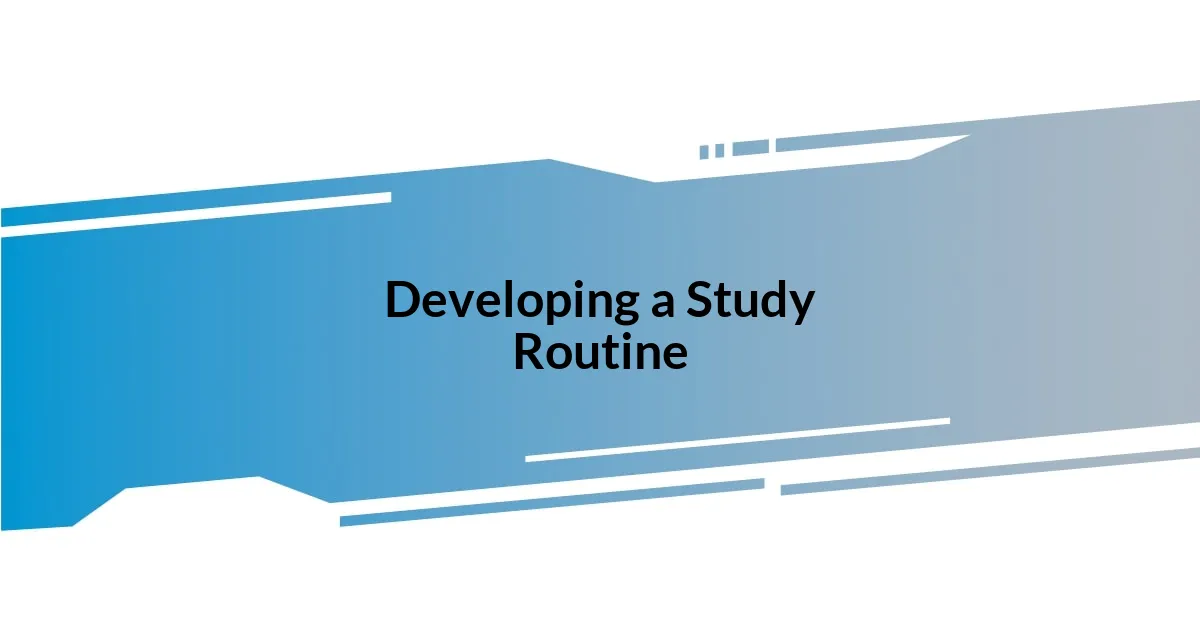
Developing a Study Routine
Creating a study routine was a game-changer for me. Initially, I wasn’t sure where to start, but I experimented with different times of day to see when I felt most alert. For instance, I found that mornings were my peak hours—quiet and uninterrupted. That insight allowed me to carve out dedicated time slots, turning studying into a non-negotiable habit rather than an afterthought.
- Set a consistent schedule that fits your lifestyle.
- Identify your most productive times of day and plan study sessions accordingly.
- Incorporate short breaks to maintain focus and reduce burnout.
- Use tools like calendars or apps to remind you of your study times.
- Reflect at the end of each week to see what worked and what needs adjustment.
Through trial and error, I established a routine that not only kept me on track but also made studying feel more manageable. I vividly remember a time when I decided to stick to my routine for an entire month; it felt liberating to see my progress blossoming like a well-watered plant. The key was to remain consistent and adaptable, recognizing when I needed to tweak my approach. This evolving process not only helped me conquer my learning challenges but empowered me to embrace my educational journey wholeheartedly.
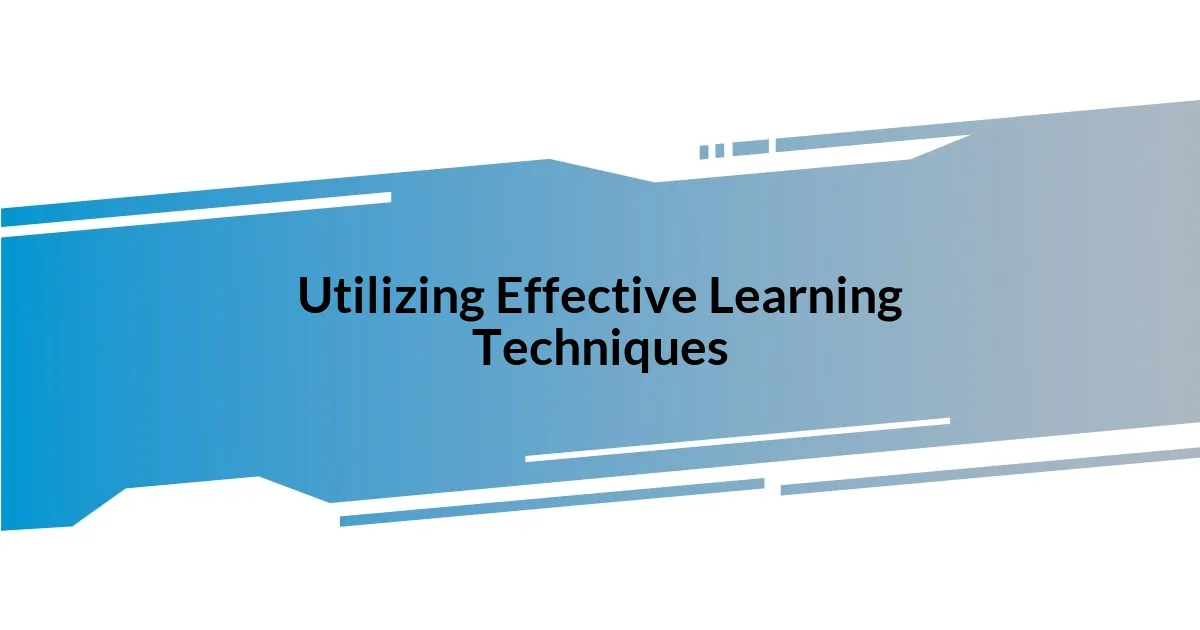
Utilizing Effective Learning Techniques
When I began exploring effective learning techniques, I stumbled upon the power of active engagement. Rather than passively reading textbooks, I started to quiz myself, turning the material into interactive challenges. I remember vividly how incorporating flashcards ignited my enthusiasm; it felt like turning study time into a game, and I found myself eagerly anticipating my next review session. Have you ever thought about how much more enjoyable learning can be when it feels less like a chore?
One technique that truly resonated with me was the method of spaced repetition. Instead of cramming information right before a test, I spread out my study sessions over days and weeks. It’s fascinating how I could retain information much longer this way. For example, by revisiting challenging topics every few days, I built a deeper understanding and confidence in my knowledge. I often reflect on how powerful that technique is in reinforcing my learning, almost like giving my brain a workout.
Visual aids also played a significant role in my learning process. I vividly recall creating colorful mind maps that connected different concepts. The moment I stepped back to observe my completed map was exhilarating—it was as if I could see the entire landscape of my learning laid out before me. I often wonder, how can transforming abstract ideas into visual representations change the way we perceive complex information? Engaging with material through multiple formats not only solidified my understanding but also made the learning experience a lot more enjoyable.
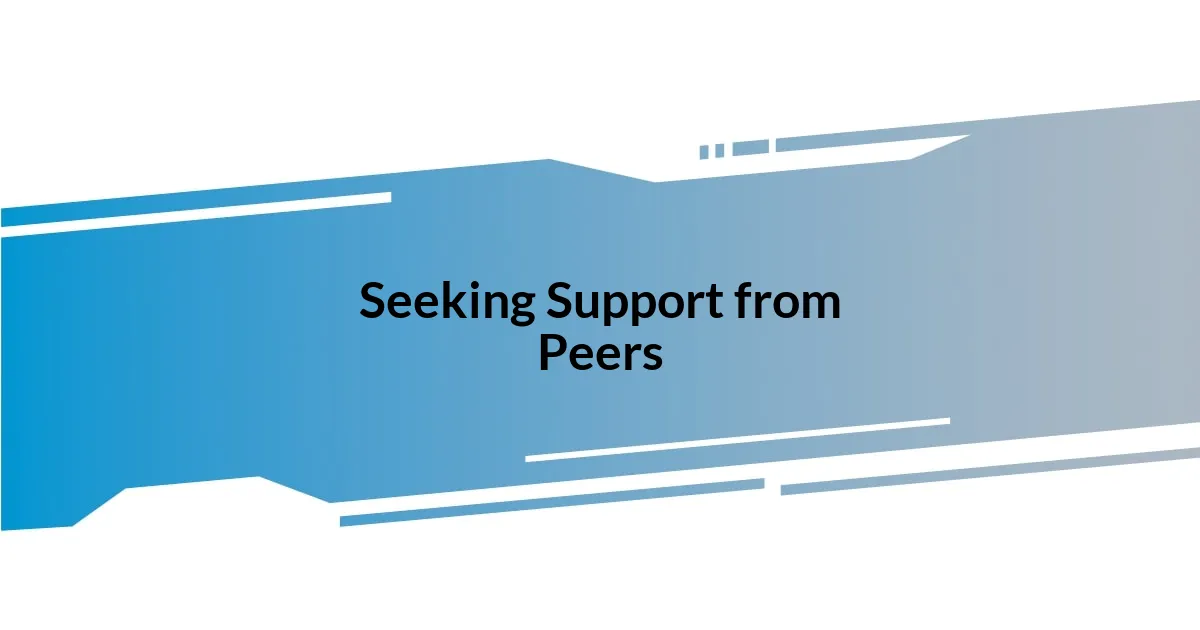
Seeking Support from Peers
Seeking support from peers was incredibly valuable in tackling my learning challenges. I remember a time during a particularly tough class when I reached out to a study group, feeling hesitant at first. It felt like stepping into uncharted waters, but those moments of sharing knowledge were enlightening. Having friends to discuss concepts with not only clarified my understanding but also made the entire process feel less isolating.
Joining forces with classmates transformed the way I approached difficult subjects. One memorable instance was when we organized a study marathon before finals. Laughter filled the room as we took turns quizzing each other, and the energy was contagious. I realized that studying didn’t have to be a solitary grind; it could be collaborative and enjoyable. What’s the point of learning if you can’t celebrate those little victories together?
I also found that seeking help didn’t mean I was weak; rather, it showcased my willingness to improve. There was a certain comfort in knowing we all experienced the same struggles. The encouragement from my peers offered motivation when I felt like giving up. Reflecting on it now, I wonder why I didn’t leverage peer support sooner—it’s truly essential in turning challenges into shared experiences, and that sense of community was a game-changer in my academic journey.
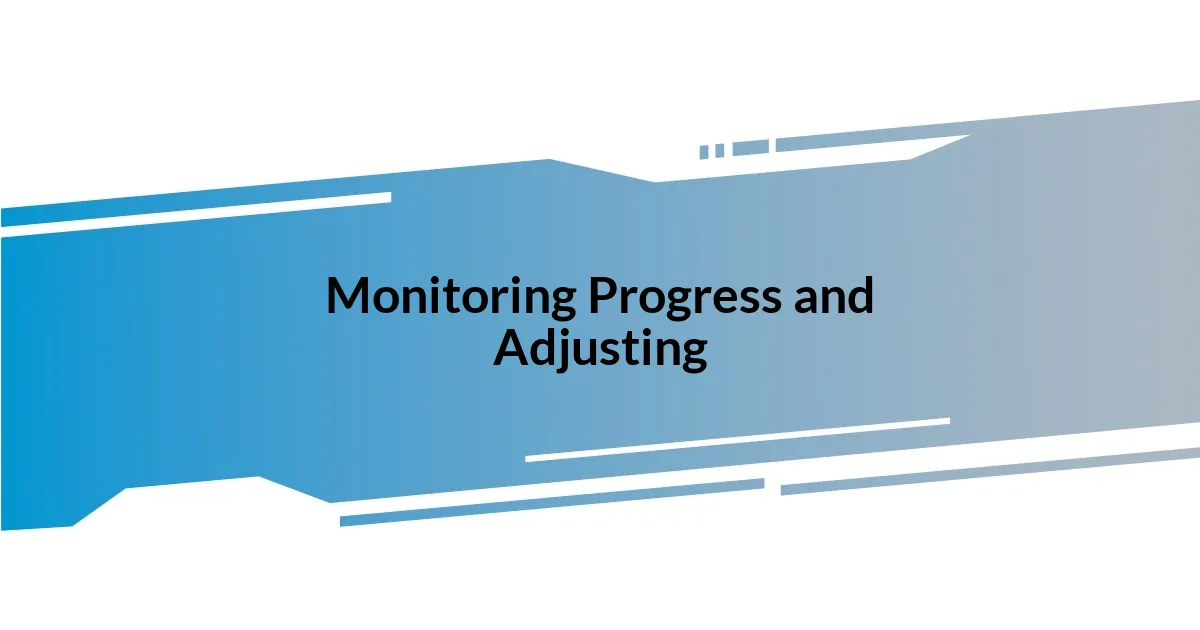
Monitoring Progress and Adjusting
Tracking my progress while navigating learning challenges was key to my success. I vividly remember setting up a simple checklist where I could mark off topics that I had grasped. Seeing those checks fill up was incredibly motivating; it felt like a tangible testament to my hard work. Have you ever noticed how rewarding it is to visualize your progress, even in small steps?
However, I soon realized that the journey didn’t end with just monitoring. I had to be flexible in my approach. For instance, after a disappointing score on a practice test, I took a step back and reassessed my study methods. I altered my focus to the areas I struggled with, which not only improved my understanding but also boosted my confidence. It’s amazing how a little introspection can lead to monumental changes in your learning strategy, isn’t it?
Moreover, I began to track my emotional state during study sessions. One day, I noticed that I was feeling particularly overwhelmed when tackling complex topics. By recognizing this, I decided to take short breaks between study bursts, which helped rejuvenate my focus and lower my stress. This adjustment was vital; it taught me that monitoring progress is not just about academic success, but also about my overall well-being. Don’t you think that learning should be a balance between challenge and self-care?
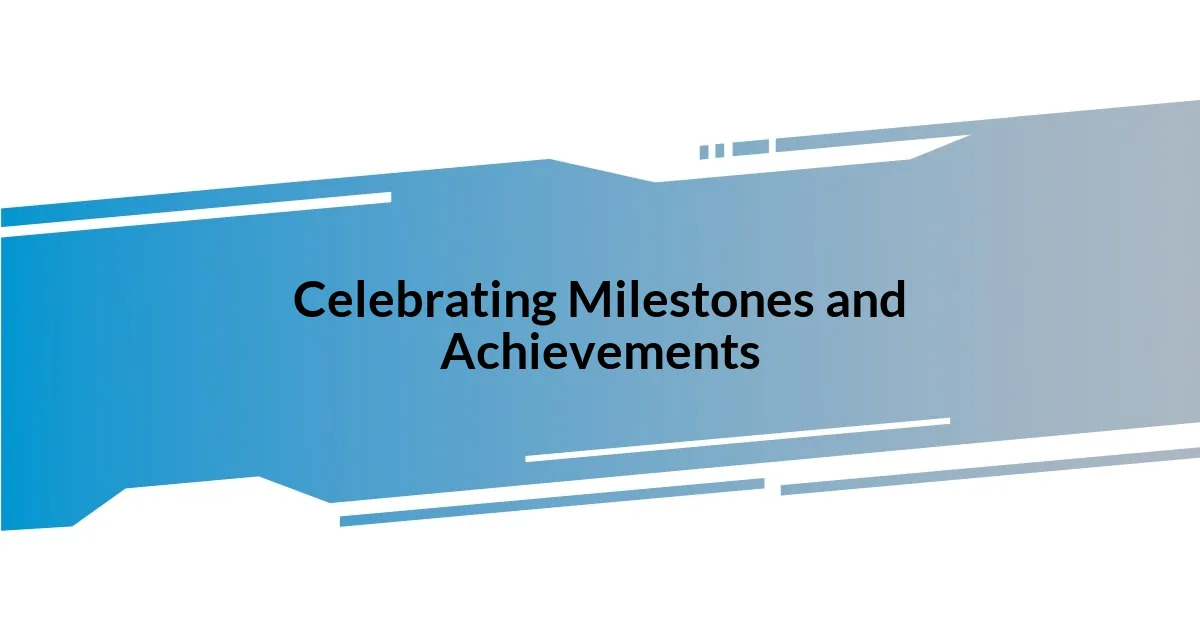
Celebrating Milestones and Achievements
Celebrating milestones in my learning journey brought a sense of joy that often fueled my motivation. For instance, I’ll never forget the thrill of acing a notoriously difficult exam after weeks of diligent study. In that moment, the satisfaction wasn’t just about the grade; it was a recognition of my perseverance and hard work. Have you ever felt that exhilarating rush when all your efforts culminate in a success?
I’ve found that it’s essential to acknowledge both big and small achievements along the way. One time, I treated myself to a favorite snack after completing a challenging project. It was a simple act, yet it made me feel valued for my efforts. Celebrating these small victories helped me stay grounded and fueled my determination to tackle future challenges. It’s like keeping a fire lit—don’t you think we all deserve to reward ourselves for our persistence?
Additionally, sharing my successes with friends and family greatly enriched the experience. I remember one particular evening when I hosted a small gathering to celebrate a significant improvement in my grades. The laughter and shared joy created a supportive atmosphere, reminding me that achievement is sweeter when it’s shared. It’s a wonderful feeling to have a community that appreciates your hard work, isn’t it? Those moments of connection were just as vital as the learning itself.